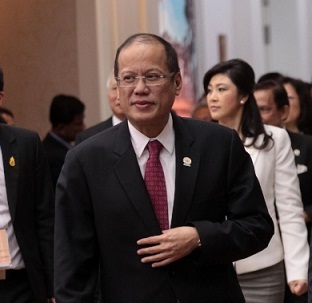
In a United States-written script, President Aquino performed his role very well as the American dummy in Southeast Asia at the 21st Asean summit in Cambodia.
In a speech before leaders belonging to the Association of Southeast Asian Nations and the group’s dialogue partners that included the United States and China, Aquino urged the U.S. to be involved in the South China Sea dispute.
Parts of the speech:“It is especially vital to have the world’s largest national economy involved in the discussions considering the interconnectedness of our current milieu…
“Each one of our nations has a stake in the stability of Southeast Asia. The United States understands this and, for this reason, has chosen to work with us to ensure the peace and continuous advancement of our region.”
The Inquirer reported that Aquino said the US presence at the Asean summits “adds a special dimension to our regional discussions particularly on issues that have far-reaching political and economic implications.”
“Our region is very diverse and its harmony can easily be disrupted by sheer political, military, or economic might. Imbalance, as we know, may lead to instability…While we are all aware that the US does not take sides in disputes, they do have a strategic stake in the freedom of navigation, unimpeded commerce, and the maintenance of peace and stability in the South China Sea.
“We continue to support the further inclusion of economies active in the region in these discussions. They serve to expand our capacities as an organization and they will certainly accelerate our progress in the pursuit of shared prosperity for the region.”
On the surface, he sounded like a small boy running to a bigger guy for help after an encounter with a neighborhood bully.
Philippine relations with China has deteriorated after a faceoff last April at Panatag shoal, also known as Scarborough Shoal, 124 nautical miles off Zambales in Central Luzon.
The Philippines also has a conflicting claim with China over islands in the Spratlys in South China Sea, which China claims wholly as its territory. Brunei, Malaysia, Vietnam and Taiwan also claim part of South China Sea. The Philippines renamed the area as West Philippine Sea.
But a closer observation of Aquino’s statements and those coming from American officials reveal the former following a script. The close collaboration with the U.S. in the Asean summit became obvious with the a senior aide to the president, Ben Rhodes, saying Obama was set to defy Beijing’s protests over the “internationalization” of the South China and will use a summit to raise concerns over area which is an important maritime passage, vital to global trade and security.
Rhodes said Obama planned to pressure China on the highly sensitive issue of a code of conduct that would govern behavior in the contested waters.”We… want to see continued momentum on the diplomatic process. ASEAN needs to talk to China about a code of conduct.”
A CNN report on the meeting of Obama and Chinese Premier Wen Jiabao, however said, the newly-re-elected American president “was keen to put the focus on trade issues, and ignored questions on a bitter maritime dispute that overshadowed discussions on the first day of the summit on Monday.
Obama merely told Wen that China and the U.S. should “work to establish clear rules of the road internationally for trade and investment which can increase prosperity and global growth.”
The CNN report quoted Alan Dupont, a professor at the University of New South Wales in Australia, who said that the while U.S. was happy to push China to the table, it was unlikely to step directly into trying to resolve the issue.
“The U.S. is not a claimant in the South China Sea dispute but it does have an interest in maintaining freedom of navigation.”
Obama is being wise, letting the immature Aquino make the noise and thus, courting the ire of the Chinese while he plays the role of regional stabilizer.
The little boy will soon find out the bigger guy will not cross the path of the neighborhood bully to protect him. He will have to learn to protect himself.
Interestng view. And here I am, an American dummy, thinking how independent and courageous the Philippine President was in not following mindlessly the path set out by China and Cambodia.
Are you suggesting the President should NOT argue for international solutions for the West Philippine sea? You prefer the China bilateral strategy?
Ang hina naman mag-isip, hindi aawayin ni Obama ang Tsina dahil lang sa Pinas dahil ito ang bumubuhay ngayon sa Amerika.
matagal na yong nanay niya ganoon din.